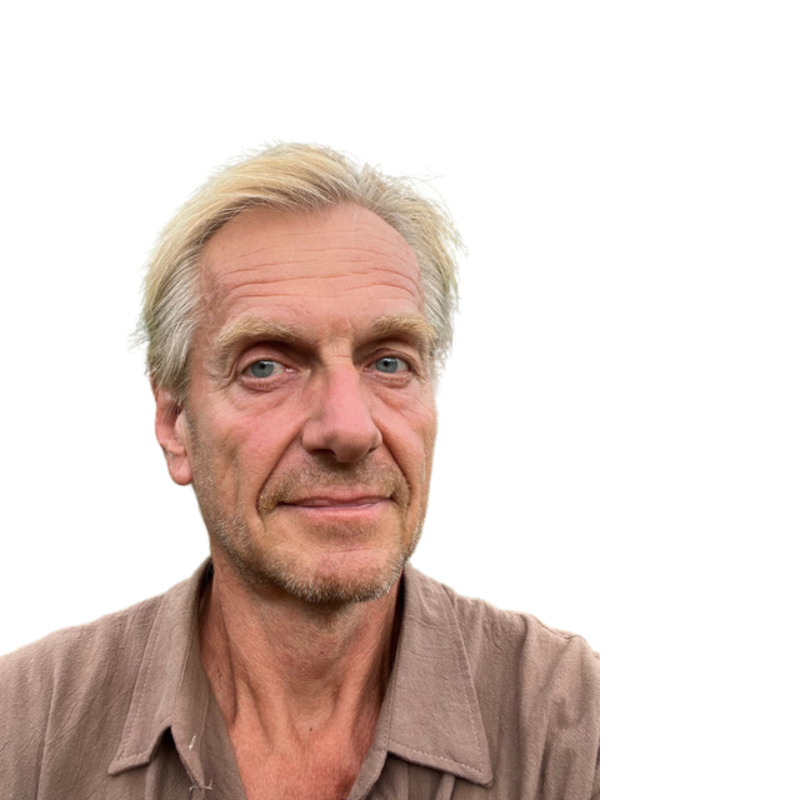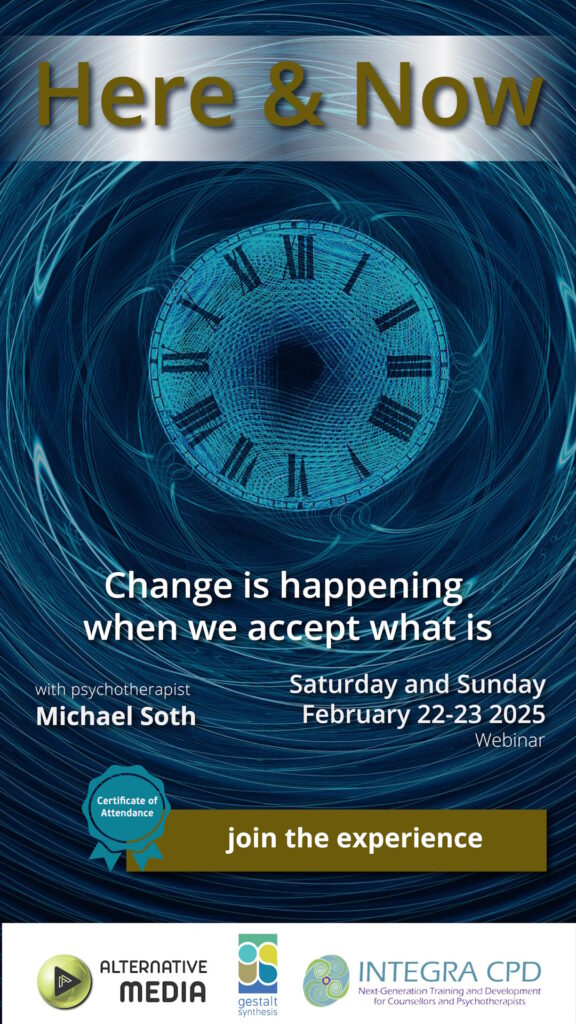
In a world obsessed with reliving the past and chasing an ideal future, the present moment often goes unnoticed. Yet, it holds the key to transformation—if only we can learn to let go and fully embrace the ‘here and now.
Michael Soth

Join Michael Soth, an internationally recognized psychotherapist, supervisor, and trainer with over 40 years of experience, for a unique opportunity to explore the depth of “being here and now.” Guided by Michael’s extensive expertise across therapeutic approaches, this weekend seminar offers an engaging and insightful experience into the power of presence, drawing on the principles of Gestalt therapy and the paradox of change: transformation begins with the acceptance of what is. This is your chance to deepen your awareness and connect to the present moment in a meaningful way.
Online Zoom Workshop
February 22nd – February 23d, 15.00 – 21.00
Online via ZOOM
50 years ago, when Fritz Perls demonstrated Gestalt therapy for the first time on television, many people were gripped and inspired by the immediacy, vibrancy and powerful impact of working in the ‘here & now’. The idea of attending to the ‘phenomenology of the present moment’ – rather than focusing on the past, the history of the biography, the roots of adult experience in childhood development – profoundly changed the way we thought about what was possible in therapy, and how long it had to take.
But now, 50 years later, for many people interested in self-development and therapy, ‘being here and now’ has become an ‘old’ idea, no longer fashionable – apparently over the last few decades the idea has lost its revolutionary and revelatory appeal. Of course, to the eternal now, our silly fashions and disenchantments are of no concern – the present moment just continues, undisturbed by our lack of appreciation of it. Of course it’s an ‘old’ idea, thousands of years old. But apparently, humanity still hasn’t got the point, after all this time – how much continuous present has to pass before we wake up and get the message?
Humanity – and much of the therapeutic field – seems to be as busy as ever repeating and regurgitating the past, or hankering after a future that is supposed to be more fulfilling than the present. All the while, the potential of the present moment is being aborted by our frantic and misguided efforts and our refusal or incapacity to let go into the ‘here and now’.
Our busy minds are lost and forgetful, clinging onto the past and grasping towards the future, missing the only moment in which life can be found. With virtual reality and artificial intelligence threatening to take over, connecting with the vitality of flesh-and-blood bodymind intelligence in the ‘here and now’ seems more important than ever, doesn’t it?
So maybe we have to revisit and re-appreciate the old idea of ‘being here and now’?
For the purpose of self-development, the ‘here and now’ is the alpha and omega. No change has ever happened in the past, and no transformation will ever occur in the future, however desperately we are seeking. But how can our awareness milk the present moment for its sweet nectar, how can we fully surrender and extract from it everything it offers and has always offered? How can we attend to the full potential of the emergent process in the ‘here and now’?
Outside of Buddhist teaching and mindfulness where attention to the present moment is one of the foundational pillars of practice, in the field of psychotherapy the significance of working in the ‘here and now’ has been declared and demonstrated most strongly and explicitly by Gestalt therapy. But as a therapeutic approach that is now more than 70 years old, Gestalt has its limitations. The more we understand what these limitations are, and by complementing these with models, ideas and techniques drawn from other therapeutic approaches, the more we are able to reinvigorate the practice of Gestalt therapy with its original promise. Many people saw that promise manifested in Fritz Perls’ famous TV presentations, where he demonstrated his work in the ‘here and now’ with volunteers from the audience. Many modern Gestalt therapists are very critical of Perls, arguing that he set a bad example for what they consider the essence of Gestalt.
Like few other therapeutic approaches, Gestalt is known for its focus on vibrancy, immediacy and experiential engagement. This is what many people are looking for in effective therapy – a method they can experience as having immediate, ‘here and now’ impact, that can be verified tangibly, subjectively. It does not require speculation or discipline or belief. As the client, you do not have to sign up to anything, you are not required to believe or take on board anything that’s not immediately obvious from your own experience. That doesn’t mean it’s easy – on the contrary: the more that Gestalt invites us into the ‘here and now’, the more we discover a fundamental – and to some extent disturbing and frustrating – paradox, discovered and formulated by Gestalt therapists 50 years ago: change happens when we accept what is. This apparently simple and innocuous phrase is a rabbit hole, or maybe a wormhole, into the mysteries of the ‘here and now’.
This online weekend workshop is an attempt to approach some of these existential mysteries through active, experiential exploration, by drawing on the wisdom and creativity of Gestalt as demonstrated by Fritz Perls, whilst maintaining also an awareness of the criticisms and dangers that have been brought against it. It is an opportunity for you to access the best that Gestalt has to offer in terms of making your ‘here and now’ experience the centrepoint of everything, and entering its transformative paradoxes. Will it make a profound difference to your life and change you? Yes, if you can accept what is, in the here and now!
This will be an online Zoom weekend, organised in Greece for Greek participants, but taking place in English with simultaneous Greek translation, so English-speaking participants from across the planet are invited.
We can expect that participants will bring quite different levels of previous experience to this workshop as well as familiarity with different kinds of therapy – we will try to do justice to this and attempt to try and turn that problem into a productive feature of our work together.
Michael has experimented for quite a few years now with the online format of Zoom for shared group experience, in a way that maximises spontaneous and embodied engagement. Throughout the weekend, he will offer brief thoughts around some fundamental principles, giving some theoretical frame to our exploration so that we can more deeply attend to each other’s experience. But most of the weekend is dedicated to experiential engagement through pair work, small group work and especially to individual demonstrations, reminiscent of Fritz Perls, when Michael will work with volunteers. Most participants find that – whether they volunteer or not – they can identify and have their own issues touched and addressed through somebody else’s individual work that resonates deeply.
We want to be mindful of confidentiality, and commit to a shared undertaking that nothing from the workshop will be indiscreetly shared with others, other than your very own personal-professional responses to the workshop.
• experiment with our subjective awareness of dropping into ‘here and now’ awareness
• notice how ‘here and now’ awareness fluctuates and oscillates, and how ‘charge’ rises and falls
• begin to recognise patterns of avoidance and distraction taking attention away from the ‘here and now’
• become curious about how such patterns of avoidance are organised and what drives them
• understanding charge and vibrancy as a parallel processes between internal and external relationship
• recognise the importance of bodily sensations and breath for being anchored in the present moment
• appreciate some of the limiting traditional humanistic assumptions regarding the ‘here and now’
• learn to apprehend the complex bodymind reality of the present moment, with its inherent conflicts
• learn to apprehend the parallel processes between the ‘here and now’ and the ‘there and then’
• engage deeply with the paradoxical principle of change, and what we mean by “accepting what is”
• expand our conception of the role of the therapist beyond traditional Gestalt notions
• notice how the client’s conflict becomes the therapist’s conflict in the ‘here and now’
• experiment with fully embracing the implications of the paradoxical principle of change for the therapist
• expanding our attention to the ‘here and now’ across all available channels of perception and communication, to include the whole field
• generating creative experiential experiments focusing attention on the ‘here and now’ at the edge of the window of tolerance

In a world obsessed with reliving the past and chasing an ideal future, the present moment often goes unnoticed. Yet, it holds the key to transformation—if only we can learn to let go and fully embrace the ‘here and now.
Michael Soth
Michael Soth is an integral-relational Body Psychotherapist, trainer and supervisor, who studied, lived and worked in the UK between 1982 and 2021. During those four decades, he taught on a variety of counselling and therapy training courses, alongside working as Training Director at the Chiron Centre for Body Psychotherapy.
Inheriting concepts, values and ways of working from both psychoanalytic and humanistic traditions, he is interested in the therapeutic relationship as a bodymind process between two people who are both wounded and whole.
In his work and teaching, he integrates an unusually wide range of psychotherapeutic approaches, working towards full-spectrum integration of all therapeutic modalities and approaches, each with their gifts, wisdoms and expertise as well as their shadow aspects, fallacies and areas of obliviousness.
His
original training at Chiron in the early 1980’s was based on body-oriented
holistic psychotherapy, strongly rooted in the Reichian and post-Reichian
tradition (including Alexander Lowen’s Bioenergetics, David Boadella’s
Biosynthesis and Gerda Boyesen’s Biodynamic Psychology). These approaches gave
him a grounding in bottom-up, energetic, bodymind ways of thinking and working,
which were supplemented by Gestalt, Process-oriented Psychology and a variety
of complementary holistic bodywork therapies. Towards the end of the 1980s –
through his practice and his own process – he began developing psychoanalytic
understandings across a variety of psychodynamic orientations, like object
relations, interpersonal and relational psychoanalysis, also including Jungian
analytic psychology and Hillman’s archetypal psychology. During the 1990s, he
became one of the early pioneers of psychotherapy integration in the UK,
reaching further into other traditions and approaches like existential,
systemic and family constellations.
Being
deeply embedded in the body-oriented tradition through his original training,
then spending many years familiarising himself not only with the theories and
techniques of psychoanalysis, but through his own therapy and process absorbing
the relational atmosphere that underpins postmodern understandings of
transference and countertransference, he has become increasingly able over the
last 30 years to build bridges between these traditions. Michael demonstrates
that whilst there are many philosophical and irreconcilable paradigm clashes
between them, in practice the contradictions can be I brought together into a
coherent integrative way of working, although out there in the field the
traditions largely remain as segregated as they were decades ago.
The topic of this weekend takes at its starting point the most simple and accessible formulation of psychoanalytic relationality, and builds a foundation for participants finding their own integration.
In 2021 Michael
left the UK, and is now living near the rainforest in Central America, where he
continues to work online as well as building a sustainable regenerative retreat
and refuge, which will host workshops and trainings in the future.
He has
written numerous articles and is a frequent presenter at conferences. He is co-editor of the Handbook of Body Psychotherapy
and Somatic Psychology, published in 2015. Extracts from his published writing as well as hand-outs, blogs and
summaries of presentations are available through his website for INTEGRA CPD:
www.integra-cpd.co.uk.